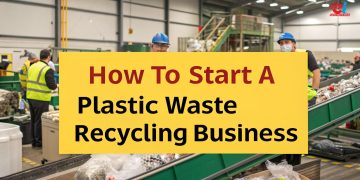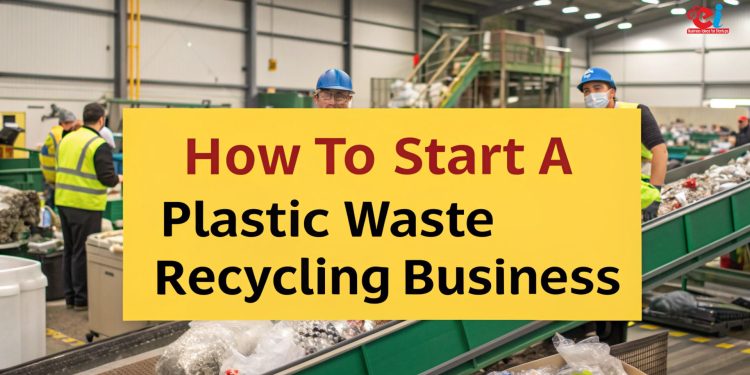The Plastic Waste Recycling is not only an ecological action; rather, it emerged as and is still evolving into an extremely profitable opportunity for investment. The growing awareness of environmental issues, along with implementing stricter plastic policies, is escalating the need for plastic products to be recycled.
For new businesses and entrepreneurs, starting a venture with the recycling of plastic could be a great sustainable business model that aims to resolve a vital issue for the globe and at the same time earn an impressive profit. This guide aims to help you take the right steps to ensure your growth and success in starting a Plastic Waste Recycling business.
Understanding the Plastic Recycling Industry
Before commencing operations, it is very important to look into the business landscape of the recycling industry. Different types of plastic materials such as PET, HDPE, PVC, LDPE, and PP, require different processing techniques. Various industries use recycled plastic in the form of raw pellets, fibers, packaging materials and even construction products.
Government bans on single-use plastics, consumer preference along with recycling bans are some of the factors driving the adoption and need for plastic products. Advances in certain recycling technologies such as mechanical recycling and chemical recycling like pyrolysis, increase the scope and the adaptability of the industry.
Examining both local and international markets will show you where the types of plastics and end-products with the most demand and profitability in your area. Knowing the landscape of your competition will also reveal market opportunities your business could target.
Related: Establishing a Plastic Waste Recycling Plant: A Comprehensive Guide
Business Model and Product Focus
Plastic waste recycling companies can operate in various places on the recycling value chain, from raw material collection, segregation, processing, and manufacturing of end-products. Defining your business model will help you streamline your operations and investments.
For example, your focus can be on selling plastic granules through mechanical recycling or supplying raw plastic material to other plastic manufacturers. Or, you can focus on making eco-friendly construction and household products from reclaimed plastic. More specialized equipment is needed for advanced markets, like converting plastic waste into fuel oil through pyrolysis, and focuses on advanced chemical recycling.
To gain a competitive advantage and build a reputable brand, a business must select a focused product line that aligns with its resources and expertise, as well as demand.
Conducting a Thorough Feasibility Study
Your new business in plastic recycling begins with a detailed feasibility study analyzing the availability and potential demand for your plastic products. This will include analyzing the price of your potential products in the market, along with evaluating the supply and consistency of plastic waste feedstock.
The study also involves selecting the appropriate recycling technologies and analyzing their operational efficiency, waste management, and environmental impact. Attention must also be given to operational difficulties like waste-segregation, transshipment, and contamination control.
Legal and regulatory requirements, such as clearances for the environment, waste handling, and other permits must be checked for compliance to avoid noncompliance blunders in the project’s life cycle. A thorough market analysis should capture potential buyers, their pricing, competition, and growth potential.
They most often prepare the Market Survey cum Detailed Techno Economic Feasibility Reports that aid in analyzing the scope and risks of the project giving a comprehensive picture for the users.
Establishing a Reliable Raw Material Supply Chain
The clean and separated plastic waste supply poses a challenge. The network of informal collectors and the heterogeneous nature of plastic waste create difficulties that hinder success in this area.
Establishing relationships with municipal waste departments, local scrap dealers, businesses, and community-based waste collectors can guarantee a constant supply of raw materials. On-site segregation and sorting systems boost the input materials and the recycling output products.
Furthermore, the promotion of waste collection education programs and the incentivization of collection activities within your region can further improve supply chain reliability while diminishing contamination levels.
For more detailed information check our Project report on Waste Management, Waste disposal and Recycling Industry
Choosing the right Technology and Equipment
The type of technology selected for the processing of plastic waste is greatly determined by the plastic materials you are intending to recycle as well as the end products to be manufactured. The most common approach is mechanical recycling, which is shredding, washing, drying, melting, and then pelletizing the plastic material.
More sophisticated chemical recycling technologies, like pyrolysis, are more expensive and require specialized expertise, but they are capable of producing fuels and chemical feedstocks from mixed plastic waste.
When purchasing any equipment, do not forget to pay attention to processing capacity, energy efficiency, upkeep, and scalability. Equipment suppliers with strong after-sales support and training are key partners to avoid prolonged downtimes and problems with the operational efficiency of the plastic waste recycling business.
Selecting the Best Site for Your Facility
The location for your recycling facility can affect the operation of the business down to the bottom line. Being closer to the source of your raw materials lowers transportation costs and ensures supply. Additionally, being close to the target markets such as manufacturers or construction places aids in easy and speedy delivery.
Make sure such places also have the required infrastructure such as electricity, water, and waste disposal. Also, check for the environmental noise, emissions, and waste management around the location.
These structures are sometimes offered in industrial parks or zones along with tax benefits and simplified start-up approvals.

Meeting Legal and Environmental Requirements
There are a number of regulations to follow when starting a plastic recycling business. First, there are business registration requirements, and environmental clearances along with permits for waste handling and processing which need to be approved.
Due to the possibility of air and water pollution, environmental compliance is the most critical. Business credibility, in most cases, comes from compliant regular monitoring and record-keeping, and following the controlled pollution standards.
Local regulators are the most relevant in early planning phases as they can provide the most critical accurate insights which could save time in the approval process along with best compliance practices.
Related: Top 10 Profitable Plastic Waste Recycling Business Ideas
Establishing Effective Plant Operations and Workforce
Your recycling plant’s layout must consider plant safety, productivity, and future expansion while optimizing the flow of materials. Each raw material should traverse through sorting, cleaning, processing, and packaging with minimal cross-contamination.
An operator and a technician familiar with recycling equipment must be sourced. Ensuring effective continuous training on the machine’s operation, maintenance, and safety procedures promotes productivity and a safe work environment.
Developing standard operating procedures (SOPs) for waste management, quality and maintenance checks will help reduce equipment breakdowns while boosting productivity.
Get Obtaining Necessary Certifications and Ensure Quality
Maintaining product quality helps build buyer trust while giving a competitive edge in the market. Invest in quality control by testing for contaminants, measuring melt flow index, and conducting durability tests.
Achieving certifications in the industry, for instance, ISO 9001 (Quality Management Systems) and ISO 14001 (Environmental Management Systems) showcase the company’s commitment to quality and sustainability, potentially attracting institutional and export market buyers.
Strong product quality management decreases product return and enhances consumer satisfaction, while promoting business growth.
Strategic Development Marketing and Sales Plan Aligned with Business Goals
Marking plastic products involves showcasing their competitive pricing while highlighting their environmental advantages, traceability, and compliance with regulations.
Expanding your market reach can be achieved by deepening networking opportunities using trade shows, industry associations, and digital platforms. Depending on your product range,focus your sales strategies on packaging manufacturers, construction, textile, or automotive companies.
In a competitive market, reliable delivery schedules, after-sales services, and customization options can help differentiate your business.
For more information, check out this video on Plastic Waste Recycling
Planning for Growth and Diversification
Once operational stability is achieved, look for opportunities to expand capacity, diversify product lines, or integrate backward into waste collection and segregation services. Keeping abreast of technological advancements enables you to adopt more efficient or novel recycling processes.
Expanding into new markets or adding value-added recycled products can improve profitability and resilience against market fluctuations.
Continuous innovation, customer engagement, and operational optimization form the pillars of sustained success.
Find Best Idea for Yourself With our Startup Selector Tool
Conclusion
Starting a plastic waste recycling business involves more than just processing plastics—it requires comprehensive planning, strategic partnerships, adherence to regulatory frameworks, and a commitment to quality and sustainability. Entrepreneurs who approach this sector with detailed market insights, robust operational plans, and customer-centric marketing are well-positioned to build profitable and impactful enterprises.
About Niir Project Consultancy Services (NPCS)
Niir Project Consultancy Services (NPCS) provides expert Market Survey cum Detailed Techno Economic Feasibility Reports. Their comprehensive services include detailed manufacturing process analysis, raw material requirements, plant layout designs, and financial insights. NPCS supports entrepreneurs in assessing the viability and planning the successful implementation of new industries and business ventures.


















